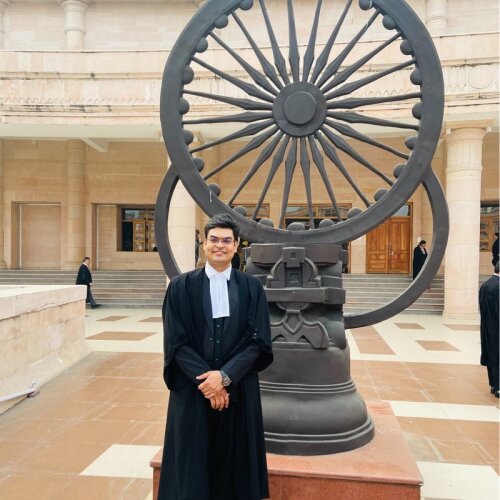Best Trusts Lawyers in Lucknow
Share your needs with us, get contacted by law firms.
Free. Takes 2 min.
List of the best lawyers in Lucknow, India
India Trusts Legal Articles
Browse our 1 legal article about Trusts in India written by expert lawyers.
- Understanding Wills and Succession in India: A Comprehensive Guide for Senior Citizens
- A Will is one of the most meaningful documents an individual can create during their lifetime. It represents much more than the distribution of wealth; it embodies the affection, foresight, and thoughtful planning of the person who leaves it behind. For senior citizens, especially, writing a Will is not a... Read more →
About Trusts Law in Lucknow, India
Trust law in Lucknow, India, as part of the broader Indian legal context, primarily revolves around the Indian Trusts Act of 1882. This legislation governs the formation and execution of trusts in India, providing a framework for trustees and beneficiaries. Trusts can be established for various purposes, such as managing family wealth, setting up charitable foundations, or fulfilling certain economic or personal intentions. While the Indian Trusts Act provides the foundational laws, local nuances can vary, and legal advice specific to Uttar Pradesh and Lucknow can significantly aid in ensuring compliance and effectiveness.
Why You May Need a Lawyer
Legal expertise in trusts is often indispensable for several reasons. Individuals or entities may require a lawyer to draft trust deeds that accurately reflect their intentions and comply with regional and national laws. Lawyers are also crucial in resolving disputes between trustees and beneficiaries or among beneficiaries themselves. Understanding tax obligations associated with trusts, ensuring proper administration and transfer of assets, and safeguarding the interests of vulnerable beneficiaries are other common reasons legal assistance is often sought.
Local Laws Overview
In Lucknow, particularly under the jurisdiction of Uttar Pradesh, there are specific adaptations and regulations that one must consider when establishing a trust. While the Indian Trusts Act of 1882 serves as the principal guiding statute, Uttar Pradesh's local property and revenue laws can impact trusts, particularly those involving real estate or significant economic activities. It's important to consider these nuances to ensure full legal compliance and smooth functioning of trusts within Lucknow.
Frequently Asked Questions
What is a trust?
A trust is a legal arrangement in which one party, known as a trustee, holds property or assets for the benefit of another party, known as a beneficiary.
Who can be a trustee in Lucknow?
A trustee can be any individual or corporation legally capable of holding property and fulfilling the obligations of the trust.
How is a trust created in Lucknow?
A trust in Lucknow can be created by executing a trust deed, a legal document outlining the trust's terms, objectives, and parties involved.
Are there specific benefits or concessions for charitable trusts?
Yes, charitable trusts in Lucknow come with certain tax benefits and concessions under both state and central regulations to encourage philanthropy.
How can disputes related to trusts be resolved?
Disputes can often be resolved through mediation, arbitration, or by approaching the local civil court in Lucknow for a judicial resolution.
Do trusts need to be registered in Lucknow?
While registration of private trusts isn't mandatory under the Indian Trusts Act, it is advisable for legal recognition and clarity, whereas public trusts must be registered.
Can a trust be modified or revoked in Lucknow?
Depending on the type of trust created, a trust can often be modified or revoked, provided the trust deed permits such changes.
What are the duties of a trustee?
A trustee's duties include managing trust assets prudently, acting in the beneficiary's best interests, and adhering to the terms specified in the trust deed.
How are trusts taxed in Lucknow?
Trusts are subject to income tax under specific provisions of the Income Tax Act, with rates depending on the trust's nature and income categorization.
What should one avoid when setting up a trust?
Avoid ambiguous terms in the trust deed, unclear beneficiary designations, and non-compliance with local laws, which may lead to future legal issues.
Additional Resources
For those seeking more comprehensive insights, resources such as the Bar Council of Uttar Pradesh, the District Court of Lucknow, and professional legal associations can be valuable. Additionally, organisations such as the Society for Participatory Research in Asia (PRIA) can provide guidance and community-based knowledge relevant to trust law.
Next Steps
If you need legal assistance in handling trusts in Lucknow, contacting a qualified local lawyer or firm specializing in trust law should be your first step. They can provide tailored advice, help draft necessary documents, and assist with registrations and dispute resolutions. Visiting the Lucknow District Court for specific procedural requirements or seeking a consultation session with the Bar Association could also provide crucial direction and support.
Lawzana helps you find the best lawyers and law firms in Lucknow through a curated and pre-screened list of qualified legal professionals. Our platform offers rankings and detailed profiles of attorneys and law firms, allowing you to compare based on practice areas, including Trusts, experience, and client feedback.
Each profile includes a description of the firm's areas of practice, client reviews, team members and partners, year of establishment, spoken languages, office locations, contact information, social media presence, and any published articles or resources. Most firms on our platform speak English and are experienced in both local and international legal matters.
Get a quote from top-rated law firms in Lucknow, India — quickly, securely, and without unnecessary hassle.
Disclaimer:
The information provided on this page is for general informational purposes only and does not constitute legal advice. While we strive to ensure the accuracy and relevance of the content, legal information may change over time, and interpretations of the law can vary. You should always consult with a qualified legal professional for advice specific to your situation.
We disclaim all liability for actions taken or not taken based on the content of this page. If you believe any information is incorrect or outdated, please contact us, and we will review and update it where appropriate.










